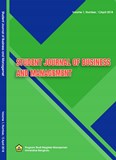Main Article Content
Abstract
The purpose of this research to examine the effect of interest in using less cash on the millennial generation in the city of Bengkulu with the Technological Acceptance Model (TAM) and Theory of Planned Behavior (TPB) approaches. This research uses an explanatory quantitative approach and uses a survey method that is distributed to 100 respondents with a self-administered survey through distributing questionnaires online and offline. The results of the analysis show that the variables studied have a significant and positive effect. (1) The perceived ease of use variable has a significant effect on the attitude of using Less Cash, (2) the perceived ease of use variable has a significant effect on the perceived usefulness of the use of Less Cash, (3) the perceived usefulness variable has a significant effect on the attitude of using Less Cash, (4) the perceived usefulness variable has a significant effect on Interest in Less Cash Use, (5) Subjective Norm variable has a significant effect on Interest in Using Less Cash, (6) Perception of Behavioral Control has a significant effect on interest in using Less Cash, and (7) Attitude variable has a significant effect on Interests in using Less Cash. This research can be used as input for the management of cashless service providers in improving cashless services to pay attention to intentions, perceived usefulness, perceived convenience, trustworthiness, and service features in improving the quality of cashless services in accordance with the development and advancement of existing information technology.
